How To Stop Brakes From Squeaking Without Taking Tire Off?
By spraying brake dust cleaner on the wheel, brake disc and pads, you can stop brakes squeak without removing the tires . In this way, you can eliminate brakes squeaking caused by moisture buildup. Ensure the cleaner is brake-specific. Grease between the pads and caliper can stop vibration squeaks. Use high-temp grease so it doesn’t melt. For other squeak causes, the wheel must be removed to lubricate pad backing or service calipers and rotors. Proper maintenance helps minimize squeaks.
Brakes making noise can be really annoying for any driver. You try to come to a smooth stop at a red light. But instead, your brakes screech loudly.
You might be thinking, “Do I really have to take the tire off all by myself? I can barely change a light bulb!” Don’t worry. I’ve got you covered in this article.
You won’t need any special tools or have to waste your whole afternoon. I’ll explain how to stop brakes from squeaking without removing the tire. That’s right, this can be done easily.
Note: Below, I have also briefed the common causes of brake squeaking. If you have preliminary knowledge, you can skip straight to the section on how to stop them.
You can also read my guide on causes of Groaning noise when braking at low speed.
For you all, I’ve established an interactive tool to help diagnose vehicle issues. It takes you through straightforward steps. Don’t miss out on trying it.
What is My Personal Experience With Squeaking Brakes?
My uncle drives an older model Ford Focus that recently started making horrible screeching noises when braking. He asked if I could take a look before paying for an expensive trip to the mechanic.
After inspecting the rotors and pads, I noticed a heavy buildup of brake dust. I advised spraying brake cleaner on the components without removing the tires. After a few applications and test drives, the squeaking was eliminated. My uncle was thrilled to have quiet brakes again without breaking the bank.
Why Do Brakes Squeak?
The squeaky noise from the brakes can be due to the following reasons:
1. Brake Dust Between Brake Pads and Rotor
The brakes make the car slow down. When the brakes are used, the brake pads rub against the rotors. This makes friction that slows the car.
As the brake pads rub the rotors, the pads wear down. Tiny bits of metal and brake pad pieces are left behind on the rotors and pads. These bits build up. They are called brake dust.
From my view, the brake dust acts like sandpaper. Over time, when the brake pads hit the rotor, dust gets stuck in between. This makes a grinding or squeaky noise. Sometimes the noise is so loud you can hear it inside the car.
You can’t see the brake dust. But over time it can cause problems for the brakes and wheels.
Semi-metallic brake pads make the most dust. This is because they get very hot when they rub the rotors.
2. Brake Pad Vibrating Against The Rotor
The brake pads press against the rotor when you step on the brake pedal. The friction between the brake pads and rotor makes the brake pads vibrate very fast. This fast vibration causes the brake pads to wiggle back and forth on the rotor. That wiggling creates the loud squealing noise you hear.
The noise gets louder if the brake pad is not shimmed right. A shim is a thin metal plate. It goes between the brake pad and the brake caliper. The shim sits on the backing plate of the brake pad.
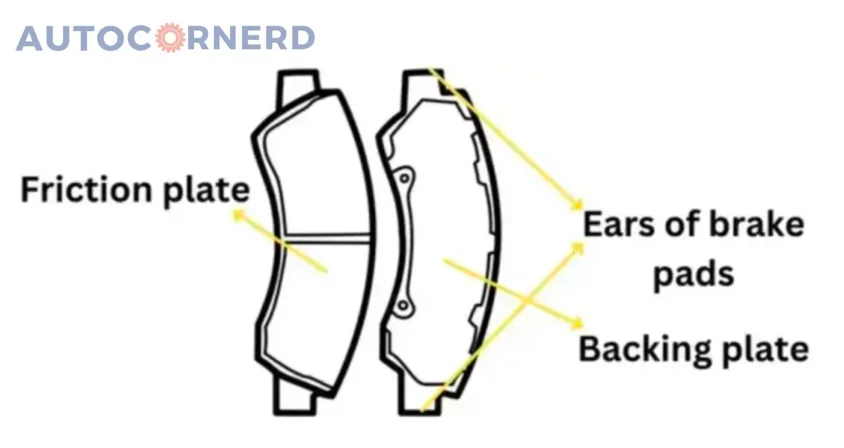
The shim dampens the vibration of the pad. This helps reduce the squealing noise.
Many brake pads already have a shim installed. But some pads don’t come with one. If there’s no shim, the pad can vibrate more on the rotor. That causes more loud noise.
3. Brake Pads Are Not Bedded In
The new brake pads need a gentle breaking-in. This means driving the car slowly for a short time with frequent braking.
This helps put a thin layer of the friction stuff onto the brake rotor. The layer makes the brakes work smooth and quiet.
If the new brake pads aren’t broken in, they can squeak when braking. The friction stuff can’t grip the rotor right, so it squeals as it slides over the rotor surface.
4. Sticky Caliper Pins
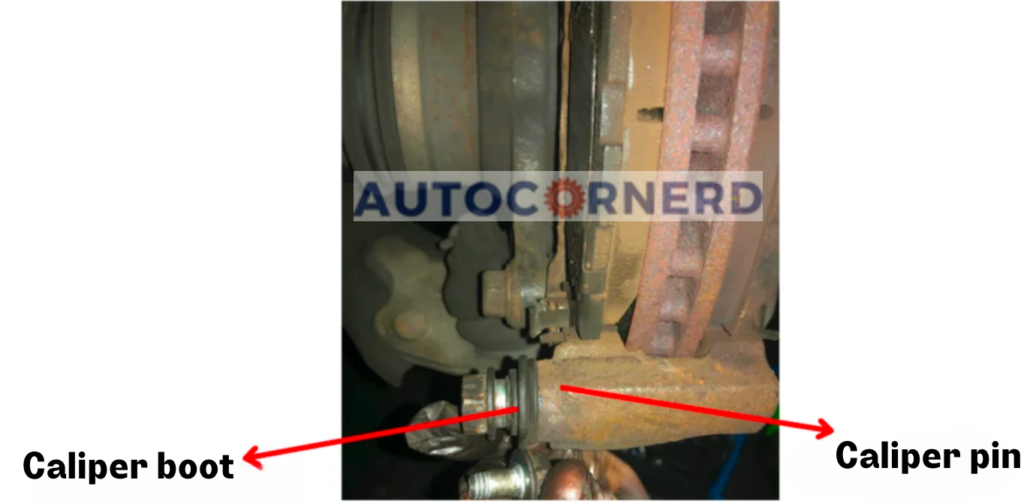
When the brake pedal is pressed, the brake oil pushes the piston forward, causing the brake pads to press the rotor.
As a result, the force acts in the opposite direction on the caliper, which moves along the caliper pin. This causes the braking pad on the other side to press against the brake disc.
In order to understand the purpose of a caliper pin, I have attached a short clip of a Youtube video below:
Caliper pins are lubricated with grease so that they can move easily when the brakes are applied.
When the grease wears off, the caliper pins become sticky, causing them to not move as freely as they should. As a result, brake pads will not be pressed uniformly against the rotor and cause squeaky noise.
Note: If you have a sticking brake caliper, it will be hotter than calipers on other wheels.
5. Glazed Brake Pads
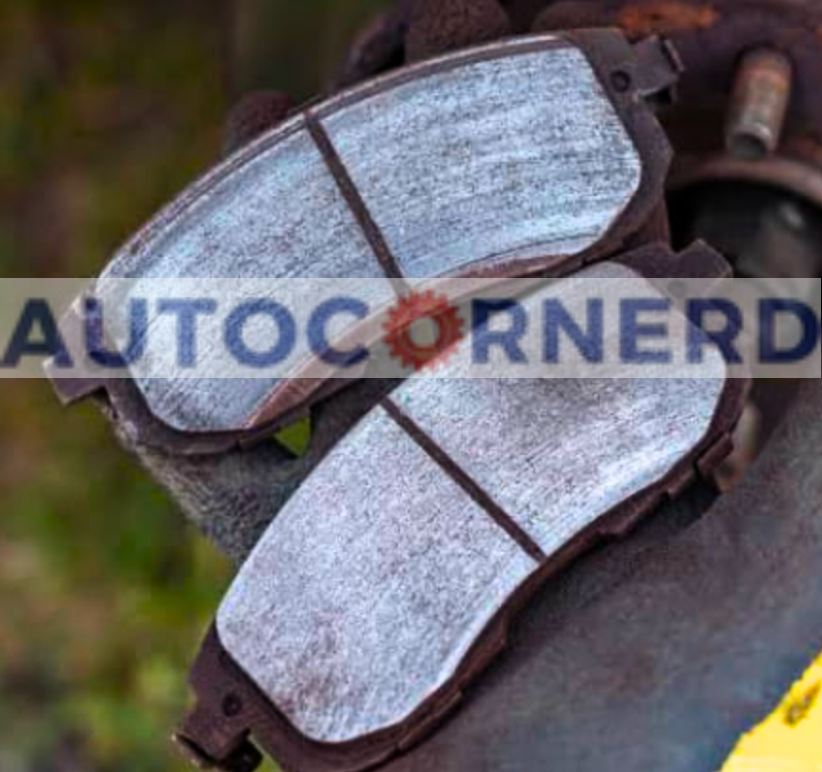
The brake pads become overly smooth and tough when too much heat or wear occurs. This condition is called glazing. The great friction and heat can make the pad material turn brittle and hard. Glazed pads cannot grip the brake rotors well. This causes squeaky noises.
Low-grade brake pad materials and harsh braking contribute to glazing. Slamming the brakes overworks the brake pads. This leads to glazing.
How to spot glazed brake pads?
Glazed brake pads look glossy and hard. They feel very smooth. You may see tiny grooves on the surface. This shows glazing.
Signs of glazed brake pads:
- Squeaking when braking
- Vibrating brake pedal
- Brakes feel less responsive
- Pads look smooth or discolored
How to Brake Noise Without Tire Removal?
Here is How to eliminate brake noise without removing tire”
1. Clean The Brake Dust Using Garden Hose
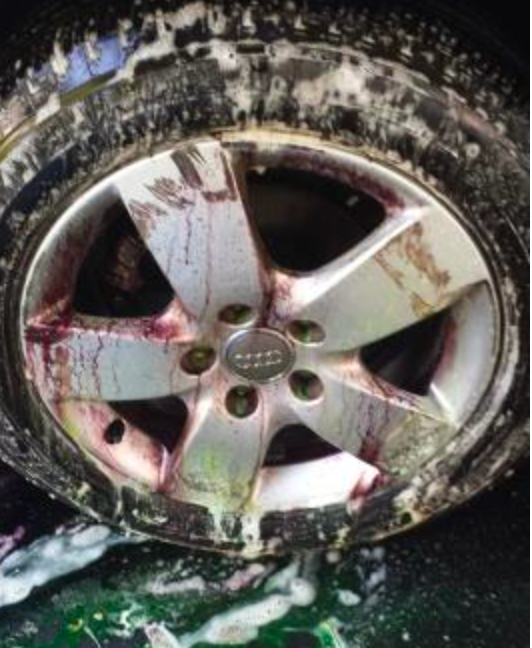
You will need a brake dust cleaner and a garden hose to clean the brake dust and eliminate squeaky noise from the brakes without taking the wheel off.
A brake dust cleaner that is nontoxic should be used, especially if working with delicate rims or a finish needing special care.
If looking for an affordable brake dust cleaner that foams and makes the brake dust float, I would recommend P&S Brake Dust Cleaner.
First, be sure the brakes are cool before starting. Now, take the brake dust cleaner and spray it on the wheels and brake caliper.
Make sure to foam it into where the brake pads are located. After spraying a few minutes, the cleaner will foam and drip all the brake dust out. Then, wash the wheel and brake caliper thoroughly with the garden hose.
Some people even suggest applying brake dust cleaner with IK Foam Sprayer or foam cannon with a 3:1 ratio for better results. Make sure to use distilled water.
2. Install Shim Or Apply Grease On The Back Of Brake Pad
When the shim on the back of the brake pads is installed properly, it can significantly reduce the amount of noise coming from the brakes.
Shims are individually tuned to match OEM brake pads and help reduce squeal/brake noise.
You can reuse old shims for brake pads. Just make sure to clean them with brake cleaner and paper towels before installation.
Moreover, you should make sure that the shims match the brake pads as the mismatched shim can cause the brake pad to rub against the rotor.
Lastly, if you do use shims, do not use two sets of them as it can cause a spongy pedal.
If your brake pad does not have a shim, you can apply high-temperature and rubber-safe grease on the backing plate of the brake pad. If the temperature of the grease is not high enough, it will melt and flow between the brake pad and the rotor.
As a result, it will damage the frictional material of the brake pad. Furthermore, if the grease is not rubber-safe, it will damage the rubber seals of the brake piston.
I will recommend ATE Plastilube grease to lubricate brake pads. Apply a thin layer of lube on the backing plate of the brake pad and ears (leading and trailing edges) of the brake pads.
3. Lubricate Caliper Pins
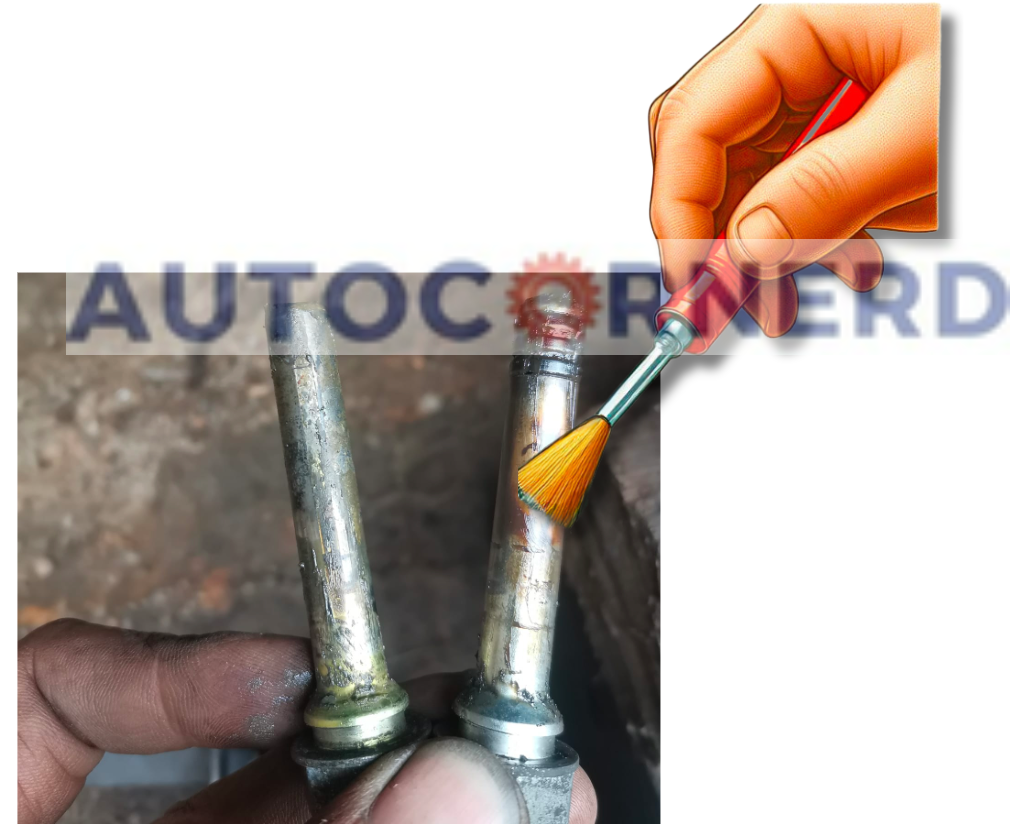
The caliper pins can get sticky. You need to remove the tire first to clean and lubricate them.
First, take off the caliper guide pin’s rubber boot and bolt. Use a wrench or socket to remove the bolt holding the guide pin to the caliper bracket. Then. take out the caliper pin.
Use a cotton rag to get all the old grease and dirt off the pin. Clean all the nooks and crannies good. You can use a toothbrush or wire brush to get hard stuff off.
If there’s a lot of dirt or rust built up in the guide pinhole, put a drill bit that’s too small in there. Turn it by hand to clear out the gunk. But be gentle so you don’t hurt the bracket by going too deep or wide. Go slow and take out the debris as you drill.
Use brake cleaner or WD-40 on a brush or cotton swab to carefully clean inside the pinhole.
Lastly, lubricate the sliding pin with a lubricant. I would recommend this one. If too much lubricant is applied to the slide pins, air can be trapped at the end of the pin creating an “air spring”. This condition causes the caliper/pad assembly to drag on the rotor.
4. Clean Glazed Brake Pads
The brake pads can get a light glaze on them. To fix this, first make the pads wet with isopropyl alcohol. Next, sand them using 280 to 320 grit sandpaper on a granite stone or on concrete.
You can also try rubbing the brake pads on concrete sidewalks or on asphalt roads. This will remove the glaze.
However, it is best to just get new brake pads. This is because the brake rotor is expensive. Glazed pads can harm the rotor. In the long run, fixing the rotor will cost a lot.
What Are the Tips For Tire Removal To Fix Squeaky Brakes?

The brakes make noise when you step on them. You wanted a way to make them quiet without taking the tires off. But to fix brake squeaks, you need to take the tires off. It sounds hard, but it is easy.
Follow these steps to take the tire off and tighten the bolts:
- Use a torque wrench to loosen the lug nuts a little before lifting the car up.
- Lift up the car and take the tire off all the way. Take the lug nuts off too.
- Look at the brakes and fix what is making the noise.
- Put the tire back on and tighten the lug nuts with your hands.
- Lower the car down. Use the torque wrench to fully tighten each lug nut. Tighten them in a star pattern so they get tight evenly.
Some First Hand Experiences Shared By Users In Different Communities
Our team conducted research across various online communities, forums, and subreddits to gather user comments and opinions on “how to stop brakes from squeaking”.
User 1 says:
My Honda CR-V had a similar issue. I learned that sometimes brake squeaking is caused by glazing on the pads. I used a coarse sandpaper to gently scuff the visible part of the pads. This roughened the surface and eliminated the squeak. Always wear a mask if you try this!
User 2 says:
My Mazda MX-5 Miata started with this annoying squeak. After some research, I realized it was because of rust on the rotors. I drove it on a clear road and applied the brakes a few times at higher speeds. The friction and heat cleared the rust, and the squeak stopped.
User 3 says:
I have a Hyundai Sonata and recently noticed a high-pitched squeaking from the brakes. Initially, I thought it was something serious, but turns out it was just accumulated brake dust. I used a hose to spray down the wheels and calipers, which surprisingly stopped the noise without removing the tire. Worth a try for a quick fix!
FAQs
What type of lubricant should I use to stop brakes from squeaking?
For best results, use a high-temperature brake grease lubricant to stop the brakes from squeaking. Make sure to apply the lubricant to the contact points on the calipers.
Are squeaking brakes an expensive repair?
The cost of repairing squeaking brakes can vary, depending on the cause and required repairs. Generally, if only minor repairs are needed, such as replacing brake pads or cleaning the rotors, the cost will be relatively low. If the squeaky noise persists after cleaning or replacing the brake pads, it could be a sign of more serious issues that require further inspection by a mechanic.
How often should I have my brakes checked?
It’s recommended to have your brakes inspected every 12,000 miles or at least once a year when you rotate your tires. Regular inspections can help identify any potential problems and ensure your brakes are in good working order.
What causes squeaking brakes?
Squeaking brakes are usually caused by a buildup of moisture on the brake pads or worn-out brake pads. The moisture can come from rain, dew, or condensation on the brake rotors. Worn-out brake pads may also cause squeaking because they don’t make full contact with the rotors.
Is it safe to drive with squeaking brakes?
It is unsafe to drive with worn brake pads as they can reduce stopping power and increase the risk of accidents. If you are experiencing squeaking brakes, you can visually inspect them and clean/grease slider pins or use the anti-squeal paste on the pads’ backside.
